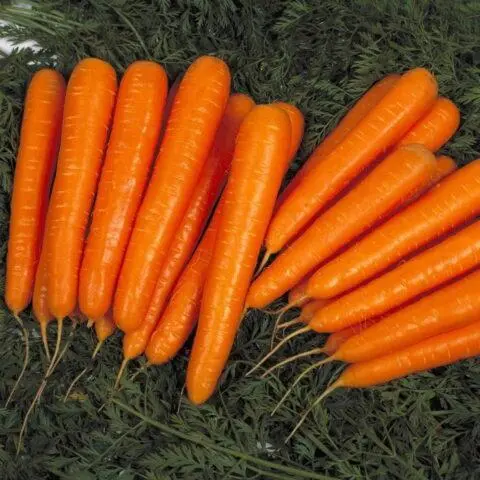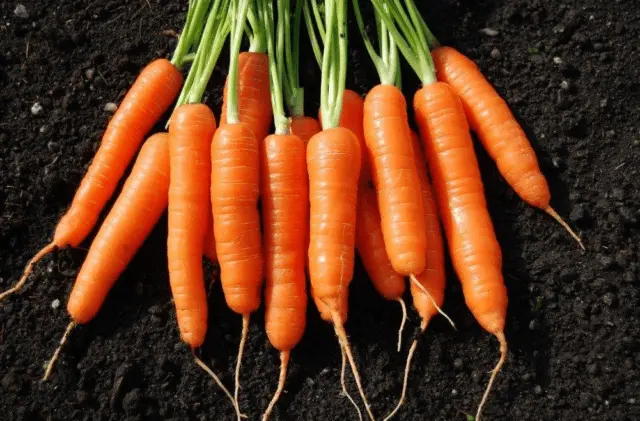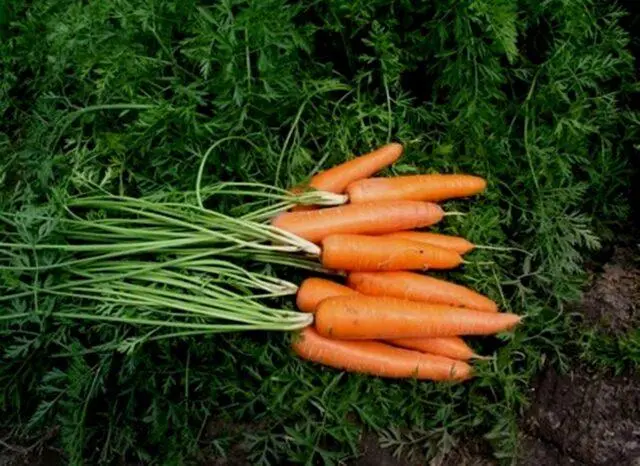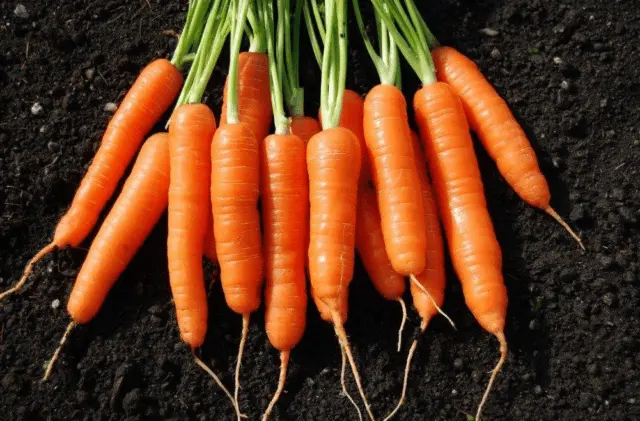Contents
Carrot Laguna is a hybrid of the Dutch selection, bred on the basis of the Nantes 4 variety. It produces large, even, cylindrical roots with a smooth surface. Differs in high productivity. At the same time, the culture is demanding for watering, which is especially important to take into account in regions with insufficient rainfall.
History of breeding
Carrot Laguna (Daucus carota L.) is a hybrid of the first generation (F1), bred on the basis of the Dutch company NUNHEMS BV (it is also the originator). An application for inclusion in the register of breeding achievements was submitted in 2005, and in 2007 the crop was registered. The hybrid was bred on the basis of the classic variety type Nantes 4, therefore it has a number of common properties.
Description of the Laguna carrot variety
Carrot Laguna produces a semi-spreading rosette of leaves. Tops of medium size, green, finely dissected. Root crops are medium, there are also large ones, they reach 27 cm in length. 3 cm in diameter. Weight 80-110 g, less often up to 120 g. The color is bright orange.
The taste of Laguna carrots is pleasant, sweet. The pulp is moderately juicy, the share of dry matter is from 10,1% to 13,8% by weight. The total sugar content is from 5,0% to 7,3%, carotene – up to 17,2 mg per 100 g of fruit.
The core is small. Moreover, in medium-sized root crops, it is almost invisible or completely absent. In large carrots, the core is more pronounced, greenish. The shape of the roots is cylindrical, oblong, the surface is even, without bends and other defects. The eyes are thin, light, hardly visible. There are thread-like lateral roots, but they are short. The ends are blunt, without sharpening. heads are even.
Characteristic carrots Laguna
Carrot Laguna is quite demanding on heat. It does not withstand long frosts. Even short-term temperature drops to -1 degrees and below lead to a drop in yield. Also, the hybrid needs fertile soil, regular watering and other care measures.

Root crops are formed in 2,5-3 months
Ripening period
The ripening period of Laguna carrots is 80 days – this is the time that passes from the appearance of the first shoots to the onset of the stage of technical maturity. The hybrid belongs to early ripening, which makes it possible to grow it not only in the south of the country, but also in regions with a short summer (North-West, Urals, Siberia, Far East).
Productivity
The yield of Laguna carrots is 5-6 kg per 1 m2. With industrial cultivation, the indicator reaches 186-316 c/ha, which corresponds to the Losinoostrovskaya 13 variety standard. The maximum value of 391 c/ha was registered in the Rostov region.
Disease and pest resistance
The immunity of hybrids is good, and the Laguna variety is no exception. Subject to the rules of agricultural technology, the culture is rarely affected by diseases or pests. However, in conditions of high humidity, it can suffer from septoria.
Also, plants are often attacked by aphids, carrot flies, psyllids and other pests. Therefore, planting Laguna carrots should be periodically inspected. If white spots are found on the leaves and other signs of disease, they are treated with folk remedies or special preparations.
Landing regions
Carrot Laguna is approved for cultivation in the regions of the North Caucasus. It can be cultivated in neighboring territories – Krasnodar, Stavropol Territory, Astrakhan Region, Crimea. Judging by the reviews of summer residents, carrots can be grown in the Chernozem region, the Volga region and the middle lane, in the Moscow region.
Advantages and disadvantages
Carrot Laguna is valued for its good yield, attractive appearance of root crops, and pleasant taste. The hybrid is resistant to diseases, grows normally not only in the south, but also in the regions of the Black Earth and the middle zone.

Root crops are large, with a smooth surface, bright orange color
Pros:
- good yield;
- attractive appearance;
- pleasant taste;
- precocity;
- seed germination 95%;
- transportability;
- resistance to many diseases;
- winter sowing of seeds is possible.
Cons:
- keeping quality is small;
- resistance to frost and septoria.
Growing tips
Laguna carrot seeds are planted in open ground in the middle or second half of May, when the air temperature is 15-20 degrees and above. At the same time, two crop rotations are possible in the southern regions:
- The first is sowing seeds in mid-April, harvesting at the end of June.
- The second – landing in early July, digging – in mid-September.
The landing site is chosen open, sunny and dry (without stagnant water in the lowlands). The best crop precursors are cabbage, cucumbers, onions and tomatoes. 1-1,5 months before planting, the site is dug up and a complex fertilizer or organic matter (humus, compost) is applied. If the soil is clay, you will need to close up sawdust or sand.
Previously, Laguna carrot seeds are pickled in a weak solution of potassium permanganate for 5-6 hours. If they were in the package, then additional processing in stimulants is not needed. It is enough to reject damaged grains.
The landing algorithm is standard:
- Mark furrows 3 cm deep.
- Retreat 15 cm between rows.
- Plant the seeds at a distance of 4-5 cm.
- Cover with soil and water.
Laguna carrot care is standard. It should be remembered that the culture needs regular watering. In the absence of rain at least twice a week. Fertilizer is given twice: after the formation of four sheets and after 3-4 weeks. In both cases, a complex composition is used. The soil is periodically loosened, weeding is done.

Regular watering and occasional fertilizing ensure good crop yields.
Pest and disease control
When white spots (septoria) appear, Laguna carrot plantings are recommended to be treated with an effective fungicide (one drug to choose from):
- Bordeaux liquid;
- “RAW”;
- “Tatu”;
- Fundazol;
- “Profit”.
They fight with aphids, psyllids, carrot flies and other insects with folk remedies – a solution of laundry, tar soap, an infusion of garlic, onion peel, chili pepper, tobacco dust. In extreme cases, insecticides are used:
- “Inta-Vir”;
- “Biotlin”;
- “Fitoverm”;
- “Bitoxibacillin”;
- “Confidor” and others.
Harvesting and storage of crops
When planting Laguna carrot seeds in early May, the crop can be harvested from mid-July to the second half of August (from 80 to 120 days after germination). Watering must be completely stopped 3 weeks before harvesting.

Harvest best in sunny and dry weather
To ensure maximum safety, the tops are immediately removed, leaving stumps 3 cm high. Storage is carried out in the basement at a temperature of 3-5 degrees Celsius and a humidity of more than 90%. Under such conditions, Laguna carrot roots lie for up to five months. To increase safety, it is recommended to put them in boxes with sand.
Conclusion
Carrot Laguna is a productive hybrid that is valued for its good taste. Root crops are even, approximately the same size, which makes it possible to grow them not only for themselves, but also for sale. Carrots are universal, suitable for dietary nutrition. It is used fresh, in a variety of dishes and preparations.









